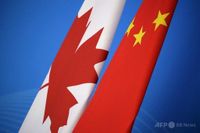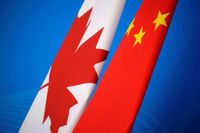On March 19, 2025, the Canadian government made a shocking announcement regarding the execution of four Canadian nationals by China for drug smuggling. This act has led to an intense diplomatic backlash from Canada, as Foreign Minister Melanie Joly expressed profound condemnation for the actions of the Chinese government.
The four individuals executed were dual citizens, marking a grim turn in their fates amid ongoing tensions between the two nations. In her remarks in Ottawa, Joly articulated Canada’s strong disapproval, stating, "We strongly condemn the executions carried out against Canadians in China." Her comments reflect the gravity of the situation, especially since the Canadian government had previously sought leniency from China, only to be rebuffed.
Joly affirmed that she and former Prime Minister Justin Trudeau, who resigned just last week, urged China to reconsider harsh penalties against Canadians facing serious charges. However, their appeals went unheeded, resulting in the tragic fate of the four men. Joly also noted that due to privacy requests from the families of the executed men, she could not delve into specific details surrounding the cases.
In response, the Chinese Embassy in Canada released a statement emphasizing the severity with which China treats drug-related crimes. They asserted, "Drug-related crimes are serious crimes recognized worldwide as extremely harmful to society," suggesting that the executions were a necessary consequence of the individuals' convictions. The Embassy elaborated that China consistently imposes severe penalties for such offenses, maintaining a strict 'zero tolerance' policy towards drug issues.
The circumstances surrounding these executions are enveloped in a broader context of strained relations stemming from several incidents over the past few years. It all began in December 2018, when Meng Wanzhou, the Chief Financial Officer of Huawei Technologies, was arrested in Canada at the request of the U.S. government. Following Meng's arrest, China retaliated by detaining two Canadian citizens, a move widely viewed as a direct consequence of the diplomatic situation. These individuals, along with Meng Wanzhou, were eventually released in 2021, but the repercussions of those events have lingered, casting a long shadow over Canada-China relations.
In a move viewed as a potential retaliation, China recently announced it would impose tariffs on certain Canadian agricultural products and foods. This decision is believed to be a direct response to Canada's tariffs on Chinese electric vehicles and steel and aluminum products, enacted last year. The recent executions serve to exacerbate an already fraught relationship, leading to speculation about the future of diplomatic negotiations between the two nations.
As the political fallout continues, international scrutiny is increasing, particularly around human rights practices in China. Amnesty International has consistently reported that thousands are executed in China every year, an issue that poses a significant ethical dilemma for foreign governments engaging with the Chinese state. Joly's comments and the Canadian government’s response to the executions underscore the complexity of navigating these issues while attempting to maintain diplomatic channels.
This situation raises crucial questions: How will Canada respond moving forward? What implications will this have for future dealings with China? The Canadian government is now at a crossroads, and the actions taken in the coming weeks and months could redefine not only its relationship with China but also its policies regarding human rights in foreign relations.





